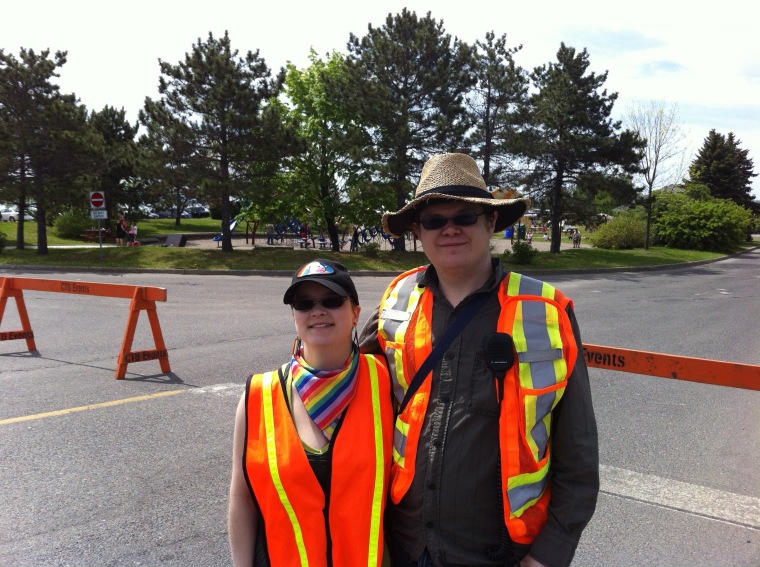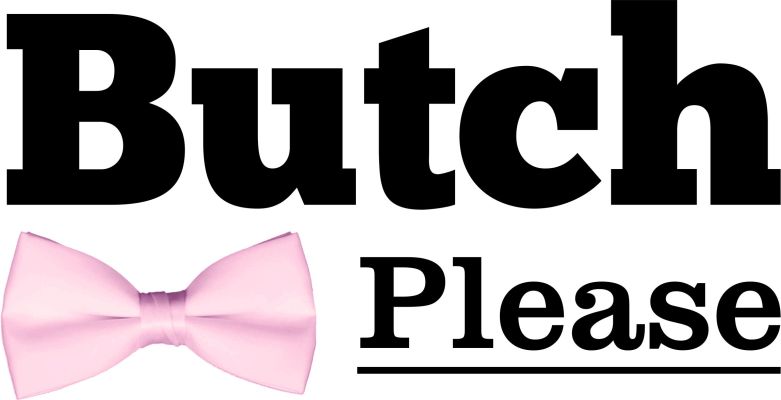Guest post by PhebeAnn.
In her post “The Same-Sex Choice,” Kate posted this quotation from Robyn Ochs:
“Many lesbians and gay men believe that bisexuals have less commitment to ‘the community’, and that whatever a lesbian or gay man might have to offer to their bisexual partner will not be enough to outweigh the external benefits offered to those who are in heterosexual relationships. […] What gets lost in the fear is the fact that same-sex relationships also offer benefits not available in heterosexual relationships: the absence of scripted gender roles, freedom from unwanted pregnancy, the ease of being with someone with more similar social conditioning, and so on.”
I can relate to Ochs’ and Kate’s appreciation of the benefits offered by a same-gender relationship.
I am a bisexual woman who is primarily attracted to other women. From the age of 17 to the age of 21, I identified as a lesbian. I’ve never been particularly interested in dating men. This lack of interest is less because I’m more physically attracted to women of all gender presentations than because of the things Ochs talks about above, and that Kate talked about in her piece. Women tend to be socialized to be more communicative, empathetic and emotionally open. Women tend to be less easily offended when their femininity is threatened than men do when their masculinity is threatened. Two women by default must negotiate relationship roles apart from how these would arbitrarily be designated by gender.
Because of all these appealing elements of a same-gender relationship, paired with my strong sexual attraction to women, I always thought I’d end up in a monogamous or monogamish relationship with a woman. When my first long term relationship of six years ended – a polyamourous relationship with a woman – I had no plans to date men. When I felt ready to date again, I put up profiles on dating sites where I sought to date only women. But before long I was in a monogamish relationship with my best friend/neighbour Jon, a straight cisgender man.
Let me be clear, I initiated the relationship. Six years ago, I asked Jon to be my lover, and my life partner, despite envisioning a relationship with a woman and considering myself fairly gay. I did this because Jon, as my friend, was already providing essentially everything I was looking for in a partner, other than sex. He is an excellent listener, better than I am. We talk about everything, all the time. He is always interested in discussing things usually relegated to “girl talk,” from relationships (platonic or not) to menstruation. When we are in mixed-gender groups he tends to gravitate to where the women are congregated, as that’s where he feels more comfortable. He is one of the few people I know who is as nerdy about feminist and queer theory as I am (we met in grad school and bonded over our shared undergraduate degrees in Women’s Studies).

Jon routinely queries and queers sexuality and gender norms and is not afraid to engage people in conversation about their assumptions around gender, sexuality and relationship roles. We make conscious choices about the roles we take on in our relationship and discuss their gendered dynamics. Jon does the dishes, cleans the bathrooms, and scoops the litter boxes. He asked me to teach him how to hem and mend his own trousers so I/another woman wouldn’t have to do it for him. He is in no way threatened that I am the one who owns and knows how to use the power tools in the family. He tells everyone I’m stronger than him. He has always practiced clear, continual and enthusiastic consent in every aspect of our relationship. Jon wanted to get a vasectomy before we met, and took responsibility for preventing a pregnancy neither of us would have wanted by following through and getting one. He is empathetic towards others. He has never made me feel like my emotions are inconvenient or shameful or excessive. He supports me and cares for me every day. In short, he is everything I was looking for in a woman, and our relationship fits Robyn Ochs’ description above pretty closely.
Jon, dare I say, is an unusual man – a man who is decidedly disinterested in upholding his manliness – but he is a man nonetheless. Although his long luscious locks paired with my shaved head result in us occasionally being misgendered as two women, we do have access to heterosexual privilege most of the time. This privilege, however, makes me extremely uncomfortable. I know my relationship is queer, even if someone meeting us doesn’t. If you treat “queer” as a verb meaning “to contest the norms of sexuality and gender,” then my current relationship is equally if not more queer than any relationship I have had with a woman. Given our commitment to our queerness, Jon and I both find it frustrating when people try to impose heterosexist stereotypes on our relationship–by which they mean straight relationships, which they assume ours is.
Sometimes I feel sad that I am partnered with a man, because it means my queerness is made invisible every day, simply by how most people see us. Having done both, I would rather fight homophobia than be erased. My sadness to be “with a man” is not a sadness to be with Jon. Being with Jon brings me more joy than I knew a relationship could. My sadness is a response to my erasure.
I’m not straight, and I’m not a bisexual who ended up in a “straight” relationship. I’m a queer, bisexual person who is primarily attracted to women, and I’m in a relationship with a man who is interested in living my queer and feminist values with me. Queerness is more than who you fuck with what parts. It’s how you feel deep in the core of who you know yourself to be, and the ways you choose to live that being. I live my queerness every day, and I live it with Jon.
Author



Jon sounds wonderful, and I’m glad you found a partner who understands you so well! I’m sorry your queerness is erased, and I very much get that; it’s hard enough being bisexual. Here’s to continually questioning things and slowly de-heteronormalizing the world!
LikeLiked by 1 person
To de-heteronormalizing indeed! Thanks Morgie!
LikeLike
Thank you so much for this post. I’m just about 8 months into a relationship with a pansexual, cis man. My man sounds like a lot like yours, actually! 🙂 Anyway, I think I can speak for both my partner and I when I say that we’ve struggled with issues of erasure and concern that our “queerness” will be lost as our relationship progresses. It means a lot to me to hear from someone who’s farther into this type of relationship that it doesn’t always have to mean a loss of identity. Your final paragraph especially hit home with me. So again, thank you very much. ❤
LikeLiked by 1 person
Thank you for your comment Jay! And all the best to you & your partner for many happy queer years together 🙂
LikeLiked by 2 people